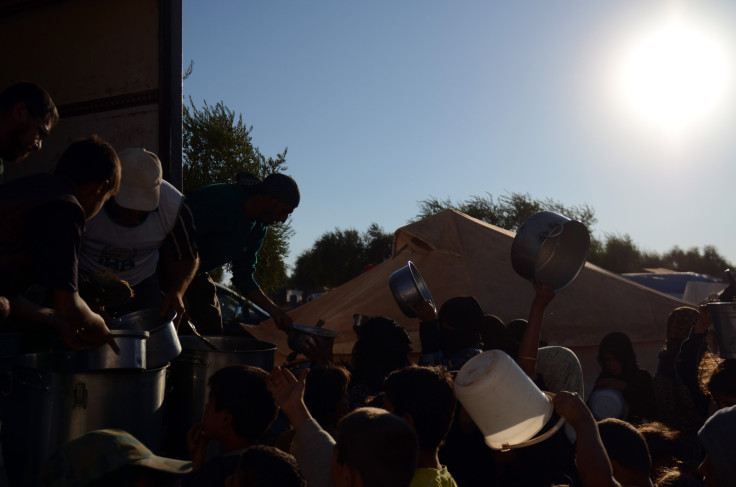Russian, Syrian Missiles Pound Aleppo, Destroy Hospital: Rebels And Aid Workers

Russian warplanes and their Syrian government allies battered rebel-held areas in and around Aleppo on Saturday, and rebels and aid workers accused them of destroying one of the city's main hospitals and killing at least two patients.
M10, the city's main trauma hospital, in eastern Aleppo, was struck as the United States and its allies urged Russia, which is trying to crush resistance to Syrian President Bashar al-Assad, to halt the bombing and reach a diplomatic resolution.
Saturday's air strikes focused on major supply lines into rebel-held areas of Aleppo - the Castello Road and Malah district and around the Handarat camp.
Fighting also raged in the city in the Suleiman al Halabi neighborhood, the front line to the north of Aleppo's Old City and in the residential Bustan al Basha quarter.
Rebels and rescuers said at least seven missiles were dropped on the hospital, more commonly known as Sakhour, by both Russian jets and Syrian helicopters.
An American relief organization said two patients were killed and 13 injured in the attack, which was the second on the hospital in less than a week.
"The hospital is now out of service completely. There's destruction to walls, infrastructure, equipment and generators. There are no more guards or staff left. It's complete darkness," said Mohammad Abu Rajab, a radiologist in the hospital.
Footage of the bombed hospital on social media showed extensive damage.
The attack drew immediate condemnation from France and Germany. French Foreign Minister Jean-Marc Ayrault said the shelling of healthcare structures and personnel in Aleppo amounted to war crimes, adding: "Their perpetrators will be held to account."
"The bombing of Aleppo needs to finally stop! Whoever wants to fight terrorists does not attack hospitals!" German Foreign Minister Frank-Walter Steinmeier tweeted.
The U.S envoy to the United Nations last week called Russia's actions in Syria "barbarism," not counter-terrorism.
An official for U.S. President Barack Obama's administration condemned the bombing, citing "total disregard" for medical professionals and those needing their help.
"Reports of yet another hospital being destroyed further demonstrates the total disregard for the lives of medical professionals and their patients who need critical care because of the Assad regime and Russia's relentless campaign against the Syrian people."
Rebels said Moscow and the Syrian army have for months been targeting power plants, hospitals and bakeries to force into surrender the nearly 250,000 believed trapped in the city.
Hundreds of people have been killed in indiscriminate bombing of residential areas and many hundreds more wounded, with little access to treatment in hospitals that lack basic supplies.
The army, aided by hundreds of Iranian-backed militias who have arrived in Aleppo, have backed up the air campaign with a ground offensive on several frontlines.
"The regime is spearheading an attack on all fronts and is trying to open more than one major front and of course there are a lot of amassing of troops mostly based in Handarat," Abu Haidar, a commander in Fastaqim, one of the rebel groups inside Aleppo, said via internet messaging.
In a telephone conversation with U.S. Secretary of State John Kerry on Friday, Russian Foreign Minister Sergei Lavrov said Moscow was ready to consider more ways to normalize the situation in Aleppo, the ministry said.
But Lavrov criticized Washington's failure to separate moderate rebel groups from those the Russians call terrorists, which had allowed forces led by the group formerly known as the Nusra front to violate the U.S.-Russian truce agreed on Sept. 9.
The United States made clear it would not, at least for now, carry through a threat made on Wednesday to halt the diplomacy if Russia did not take immediate steps to end the violence.
Moscow and Assad spurned the ceasefire to launch the new offensive, potentially the biggest and most decisive battle of the civil war, which is now in its sixth year.
BACK AND FORTH
An army source quoted in state media said its forces had made advances, which was denied by rebels.
A news commentary by the state-run Ikhbariyah said "high level coordination from the air and ground by Syrian and Russian warplanes" had allowed the two allies to "successful hit locations where terrorist groups had dug in."
But rebels said Syrian troops backed by fresh reinforcements from Iranian-backed militias were struggling to make any gains in a ground offensive in a key frontline in the old city.
"They are shelling the old city heavily after another failed attempt to gain ground. They have lost several fighters and we are steadfast," said Abu Hamam, a rebel from the Failaq al-Sham group.
The Syrian Observatory for Human Rights, a British-based group that monitors the war, reported heavy bombardment by government forces and "back and forth" fighting in the Suleiman al-Halabi neighborhood.
Rebels led by the main Islamist rebel group Ahrar al-Sham said on Saturday they had regained several areas in the Bustan al-Pasha district seized a day before, a strategic point that would allow the army to press into the heart of the rebel held eastern sector.
Russia joined the war exactly a year ago, tipping the balance of power in favor of Assad, who is also supported by Iranian ground forces and Shi'ite militia from Lebanon and Iraq.
The army said it would press its advantage after retaking last Thursday the strategic Handarat camp north of Aleppo that had already changed hands once since the start of the attack.
© Copyright Thomson Reuters 2024. All rights reserved.





















